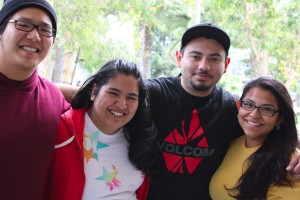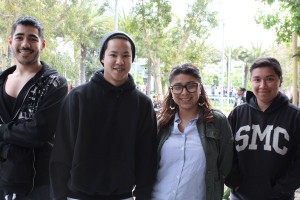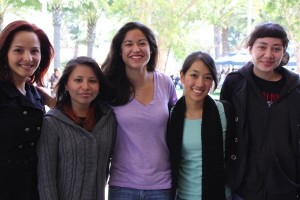“I have always believed that both women and men are equal. Little did I know that equality between men and women was superficial. In the U.S. Constitution there are only mentions of men, and none of women.” Ulices, Roxsana, Gilbert and Rosemary
I have always believed that both women and men are equal. Little did I know that equality between men and women was superficial. In the U.S. Constitution there are only mentions of men, and none of women. I learned this matter through my women’s studies class. I’ve learned that there is a new amendment that has been proposed to make both women and men legally equal – the Equal Rights Amendment.
I believe that taking a women’s studies class was beneficial for me because I was able to learn about the inequality that is still present between men and women. If men and women are capable of having the same occupation, shouldn’t they be treated equally and fairly? I’ve always thought about it this way that men and women should be equal in all aspects. I now understand why some women would say that men have it easier, because I can see the difference on how men and women are treated.
This women’s studies class has been an interesting experience since the first day I entered the class. I really didn’t know what I was getting myself into, but once I listened to what the class was about and everything that had to be done, I got scared. Then I realized that I could in fact manage the work and just continued the class. This class has affected me positively because it taught me more about women in my past that I didn’t even know about. All the guest speakers that have gone to class and taken the time to talk to us have shown me that anything can be possible if we set our minds to it.
The days progress as we continue to work for this ERA Education Project and in light of all the recent knowledge that’s been shared with me, my perspective of things has changed. The class has made me more observant of the people around me. Just the other day I found myself making observations of how our society demeans women not because it’s their intent to insult, but because it is the norm.
Growing up with one older and three older male cousins has kept me in a sort of bubble with regards to equality. Not to say I felt men were more capable, but it feels more and more that it’s an actual misconception that they are. The male machismo, at least as I have seen in my family, tends to defend that idea with such vigor that I wonder if it’s because they really believe it or because they are afraid to speak
On my first day I was presented with the question “Are you a feminist?” Not knowing what it really meant, I still answered the question by saying “no”. Femfraggists
If I was presented with the same question again today – “Am I a feminist?” I would say “yes.” I believe many of us are feminists and we just don’t know it.”
Coming into the semester, I wasn’t sure what I was going to learn. Not being very enthusiastic and just looking for extra units, I was expecting more of a class about learning the history, the importance and roles played by women in history.
On my first day I was presented with the question “Are you a feminist?” Not knowing what it really meant, I still answered the question by saying “no”. I never really considered myself to be a feminist, but at the same time I never really understood what it was, or what it meant to be one. I wouldn’t say it was because of ignorance that I never knew as much as I do now, but instead had to do with not being informed growing up.
From first grade all the way through high school, I never took a women’s history class nor was I ever involved in women’s organizations. It’s been several months since I’ve worked with the ERA Education Project, and every week I seem to be learning more and more as I work on these field assignments. Getting the chance to interview strangers, friends, and even family members has been a great opportunity, because during these interviews I get to share with people, things that I never knew.
What I enjoyed the most while working with the ERA Education Project is that we got to work on a curriculum for elementary students. I found this project great because now, at least these students will have information and knowledge that I didn’t when I was their age. Do I believe in equal rights? Yes I do. If I was presented with the same question again – “Am I a feminist?” I would say “yes”. I believe many of us are feminists and we just didn’t know it.
Why don’t college students vote? Because they don’t know their rights and because they were never taught about the Equal Rights Amendment in high school or primary or secondary school. Brenda Ajanel, Elise Becker, Adriana Magana, Joanne Sampoonachot, Rocia Zuniga
“The difference between the First, Second, and Third Waves is our cultural DNA. Each generation has a drive to create something new, to find that distinctive spark that Silver couldn’t locate that day in D.C.” (Baumgardner and Richards, 129).
Surely, feminism back in the first and second wave was much better known among women. Feminism was more radical in a sense, and it heightened when women started to flood the workplace and move out of the domestic sphere into the social sphere.
Today, feminists are still activists, but their style of approach towards activism can be defined in different fields, whether it’s through comedy tours like Keri Smith, or journalism and filmmaking like Janice Littlejohn. I think that women are all activists of feminism in their professions when they make decisions that involve politics and they are empowered to be independent.
Even the authors of Manifesta agree that fighting for equality doesn’t mean that individuals have to sacrifice their entire lives like Susan B. Anthony did to reap change. Women can find a genuine way to support and advocate for feminism in things that they love or social issues that personally affect them.
Women all struggle with sexism even when they’re not involved in politics. Keri Smith lectured in class that before starting up her own company, she worked for a bigger company that was dominated by male top dogs who sought to only maintain male values. By starting up her own company, she became an activist of feminism because she refused to be oppressed by the decisions of men who didn’t treat her equally, like her fellow male employees.
I want to shed light on why activism is important among the youth generation. In high school, my former U.S. History teacher once told me that he wished more of the youth would rebel against old, traditional and conservative norms. He believed that change was most effective when garnered by the youth because we are next in line in shaping the outcome of our future, and the government and society we wish to live in. He was absolutely right. The youth population is ultimately a minority and we are marginalized in comparison to the rest of the nation. Why is that? Because not enough college students vote when it comes to elections. And why don’t college students vote? Because they don’t know their rights and because they were never taught about the Equal Rights Amendment in high school or primary and secondary school.
Young people are full of enthusiasm, spirit, and connected by social networks like Facebook and Twitter that allow them to voice their opinions. I remember last semester I conducted research on myself to see the level of mediation I was exposed for two weeks. In comparison with high school students and my college peers, I was surprised that their level of mediation was exponentially higher than mine.
A call for change can go viral among the youth because of the tools and technology we are savvy in today. My point is that young people, especially young women are capable of deciding their own fate when it comes to tackling patriarchy but they need to have the resources and information in their academic curriculum in order to do so.
To many people, radicalism is thought of as something negative, intimidating, and a turn off for people to support a cause such as feminism. Radicalism tied to feminism is always affiliated with things like anti-men, lesbianism, or wanting to become men. Not everyone has to use radical tactics to get their point across, but radicalism should not be condemned, but rather acknowledged and appreciated. Sometimes it is necessary to be radical in order to achieve a call for change.
The Equal Rights Amendment: Now Is the Time, an article by Paul Abrams suggests that radicalism might be necessary today when using subtle methods hasn’t seemed to work for over 72 years. Today the Equal Rights Amendment is still not ratified under the constitution and therefore women are not protected equally under the law.
“In Virginia and Texas, they have forced women to have medically-unnecessary ultrasound exams without their consent. The absence of consent violates Nuremberg principles of ethical medical practices, inflicts what the law considers to be an ‘assault’ and, as if that were not enough, forces women to pay for the privilege themselves.” This particular report is a consequence of the ERA not being ratified in the U.S. Constitution. Without the ERA, women are subjected to unequal benefits from pension, tax rates, social security, and being a household mother to their children.
Baumgardner, Jennifer, and Amy Richards. Manifesta: Young Women, Feminism, and the Future. New York: Farrar, Straus and Giroux, 2000. Print.
-
Categories
-
Articles
-
Meta


